- Home
- Linda Byler
Hester on the Run Page 22
Hester on the Run Read online
Page 22
A clear whistle edged into her senses. The tune was as melodic as the first time she’d heard it. She froze. The sound was undulating, a series of warbles, chirps, and whistles, a liquid, tumbling sound like the waterfalls near where the Indian woman’s hut had been.
Slowly, Hester turned her eyes, searching the surrounding forest. The trees were bare and black against the mounds of drifted snow beneath them. The sky was whitish-gray, almost identical to the snow, with a weak winter sun shining faintly as if it was veiled. There was no wind, no sound. A few chickadees scattered a dusting of snow from berry bushes, twittering and chirping to themselves.
Her eye caught a movement beneath the trees. A small brown form, leaning a bit forward as if stalking his prey, moved through the trees. He was too far away to calculate his age or his size. When the whistling began again, she could see that the figure was clearly its source. Hester watched, holding as still as possible until the form moved farther along on the side of the mountain. It was only then that she allowed herself a deep breath, turned, and made her way carefully down the side of the slope.
Neither Noah nor Isaac would accompany her. They said she’d be safe on her own. She asked Hans if she could ride. With all the snow, it would be better. He said no, so she threw the harness on Dot, hitched her to the wagon, threw a few furs across the seat, and left without looking back.
The lump that wanted to rise in her throat was an unhandy thing and served no purpose but to bring on the hated self-pity. She swallowed, resolved to forget there was a time when Noah and Isaac would have helped her hitch up, accompanying her eagerly anywhere she wanted to go.
Lifting the reins, she slapped them down on Dot’s rump, relishing the fast trot that ensued, reveling in the dangerous swaying of the wagon as it slid back and forth. Fiercely, she hoped Hans had seen. In the past, she would have pushed such thoughts back, but now there was a difference.
Out of the sneering, the life-draining disapproval that she eventually experienced from each family member, came the small steady flame of Hester’s independence. If the wagon rolled over, crushed its shafts, and broke a wheel, there was no one to worry. She felt a freedom somehow. Perhaps a lonely kind of freedom, but she was breaking away from the chains of self-loathing.
The icy air hit her face like a slap, yet she lifted it to the elements, savoring the cold and the pure white world around her. A red bird flew away, its dipping flight pattern carrying it aloft, followed by his dull red-brown mate. Dot clopped along, throwing snow from beneath her hooves, her head held high as she pulled the wagon through the snow.
She passed Amos Hershberger’s, the smoke from the chimney wafting in gray plumes into the metallic sky. Looking up, Hester noticed the sky was turning darker. She brought the reins down on Dot’s back, who answered with a flick of her ear and an accelerated pace.
When she pulled up to the schoolmaster’s house, she was alarmed to see dark windows with no smoke coming from the chimney. Perplexed, she sat in the wagon, unsure.
The light was fading fast, the graying clouds bringing along clumps of snow that had not yet fallen but would come swirling in from the north before the night was over. Uncertainly, she stepped from the wagon. Her black shawl was in stark contrast to the snow. The steaming horse enveloped her in a gray cloud, the white of the sky behind her.
Theodore Crane stretched and yawned, pulled himself up out of his chair, scratched his ribs, peered through the glass at the darkening world outside, and yelped. Surely that was not a ghost.
He peered again, blinking his eyes as Hester moved through the fading light, the steam, and the snow. She pulled the horse and wagon to the hitching rack and threw a blanket across the horse’s back. It was only then that he recognized the dark face beneath the large flat hat. The Indian girl. Relieved, knowing it was not a ghost, he opened the door before she had time to knock.
Hester was as relieved as he was. Her quick smile showed the appreciation she felt, and she was promptly drawn into the cold, cluttered house, with Theodore’s affable words of welcome. He fiddled around with the fire until it roared up the chimney, filling the small room with radiant heat and light.
She took off her shawl and hat and held her cold fingers to the raging fire, while watching two mice nibble on a bread crust beneath the table. She smiled hopefully at the schoolmaster.
He voiced his enthusiasm when she produced the Indian woman’s book and nodded his head in understanding. He said that all the English she had written she had learned from him, and, yes, he would love to try to decipher everything else she had written in the book.
CHAPTER 21
IN THE MORNING, WHEN HANS DISCOVERED Hester’s absence, he raved and yelled, his worry causing him to become alarmingly out of control. He told Noah and Isaac they should have listened to him and accompanied her, and when Isaac stood up to his father and said they were not told to do that, he received a stinging slap on his shoulder.
Annie was terrified. She had never seen her husband so irate. She didn’t know what to make of it and set about frying bacon and stirring up biscuits, as if the sight and scent of her breakfast would mollify this awful yelling.
Hans would not eat. He told Annie to feed the children, he couldn’t eat, not with Hester gone. He yanked on his boots and fur coat, smashed his felt hat down on his uncombed hair, and lumbered through the door, still accusing Noah for not accompanying her. Were they aware that she might be lying at the bottom of a ravine, dead and frozen?
For one searing instant, Annie felt cold dread, guilt piling in on her as she remembered all the times she wished Hester ill.
Lissie cried, and Annie felt worse. What had they done? Oh, surely God’s judgment would be swift! She trembled in her shoes but kept her fears hidden from the children by firmly reprimanding them to sit up and eat, Hans had gone to fetch her back. One terrified thought after another crowded itself into her mind, and she wondered if she would be accounted for a murderer in God’s sight. The Bible plainly said that to hate someone is as bad. Annie wasn’t sure if it included humans of another color or not.
Hans searched every ravine, his eyes combing the surrounding trees as terrible thoughts of Hester’s demise ran rampant through his fevered brain. The snow was coming down in earnest, hard, stinging little pellets of misery that raked across his face beneath the wide brim of his hat.
He found himself talking out loud to Kate, telling her he was sorry. Memories of the two of them, the perfect child between them, became a fine torture, the denial of his love for Hester an exquisite pain.
A shower of snow enveloped his head as it fell from a weighty pine branch. It knocked his hat into the deep snow, leaving him wailing and floundering, searching desperately for the necessary headgear.
By the time he arrived at the schoolmaster’s house, his teeth were chattering, his hands were stiff with cold, and his toes felt like ten chunks of ice. He flung himself off his horse, pounded on the door, rattled the lock, peered in the windows, then paced the small porch, his hands behind his back, his face thrust aggressively in front of him, muttering questions and answers to himself.
He looked off across the falling snow and tried to come up with a plan. Had she arrived here at all? He looked wistfully in the direction of the trading post, wondering if the proprietor had seen her go.
But where was the schoolmaster? Oh, at school. No, this was Saturday. He should be at home.
Finally, he lay down his pride, shouldered his resolve, and pushed through the deepening snow to the front porch of the trading post. A handful of slovenly looking men stepped aside, allowing him to enter. He nodded shortly without meeting their eyes and walked quickly up to the counter where a youth with red hair looked down on him, a good-humored grin on his freckled face.
“What can I getcha?” he asked, without any greeting.
“Have you seen my daughter?”
“What’s she look like?”
“She’s Indian.”
“Yeah. I bet. Move on.
Next? What can I getcha?”
When Hans realized he was not going to be helped, he walked back and forth between a bale of furs and some fencing tools, muttering, trying desperately to come up with some way of locating Hester. He tried talking to a stolid Indian wrapped in blankets but was glad to get away from his penetrating, black eyes.
He walked back to the schoolmaster’s house and rattled the doorknob before sinking onto the snow-covered bench. Where could she have gone? Was the schoolmaster with her?
He retraced his route, a tortuous journey of fear and indecision, hoping to find her, afraid to look down rockslides and ravines.
He reentered his house around noontime and was met with questioning eyes. He shrugged his shoulders, then tore off his hat, peeled off his wet coat, hanging it across the back of a chair, and sat, starved and dejected, blaming Noah and Isaac, then Annie. Even Lissie had a turn, blamed for her baking skills.
Hans wept openly. His hands shook as he lifted the cup of scalding tea laced with whiskey to his quivering mouth. He refused any food. Annie stayed out of his way, finally understanding why she disliked him so much.
He hitched a fresh horse to the cutter, the small sleigh that whispered through the snow, and made his way to his parents’ house, pleading with them for help.
Isaac told him to sit down, think rationally, calm himself. Had he prayed? Was he seeking the face of the Lord to help him? For without faith, nothing was possible.
Out of his son’s mouth, then, came the tale of misery—Annie’s hatred of Hester, his fear of Annie, the entire family’s mistreatment of Hester—leaving Isaac without a trace of surprise.
Rebecca nodded, her mouth prim with the knowledge of having seen this all along—where had Isaac been?—but she said nothing until Hans’s voice wobbled into silence, accentuated by the shaking of his shaggy head, left to right.
Finally, Isaac spoke. “Well, Hans, perhaps this is meant to be. It is better for your household with Hester gone. You know that, and I think you know why.”
“Why would you say such a thing?’
“Hans, face it. You feel for Hester what you should be feeling for Annie.”
Hans’s denial was so emphatic, his outrage so complete, that Isaac apologized in the end, saying perhaps it was incorrect to put it that way.
Rebecca turned her back to hide her feelings, then asked if he had checked the widow Lissie Hershberger’s house. Rumor had it that Theodore Crane spent Sunday evening with her.
“Why would Hester be there?”
“It’s worth a try.”
“No. Fat Lissie doesn’t have to know.”
“Perhaps she has returned to her people, the Lenape.”
Up came Hans’s red face, shock and disbelief written all over it. One single word was forced from his mouth, in a wail of denial. “No!”
Rebecca stepped up to Hans then and spoke her piece.
In the end, he drove his horse through the snow to Lissie Hershberger’s house and found the wagon in front of her small barn, Dot munching oats in the box stall beside Lissie’s horse. He fell on his knees there in the hay-strewn barn and thanked der Herr over and over for guiding him to Hester. Relief pulsed through his veins; redemption shone from his dark eyes. He adjusted his hat, blew his nose, took a deep breath to steady himself, and walked sedately up to the porch of the little log house.
Lissie answered the door.
“Good afternoon, Lissie. I came to get Hester.” He hoped his tone of voice was normal, his countenance calm and friendly.
Lissie pulled herself up, glowering from her blue eyes. “She’s not here.”
“The wagon is.”
“Well, she’s not.”
“You’re hiding her from me.”
“I sure am.”
“Lissie, I beg you, let me see her.”
Lissie considered, then stepped aside, motioning him in with one hand.
Hester was seated at the small linen-covered kitchen table with Theodore Crane, steaming bowls of thick soup in front of them. Hester rose, holding onto the back of the chair, her eyes so large and dark in her thin face, they were like dark, turbulent pools.
With a glad cry, Hans moved swiftly across the room, gathered her against him, and held her there. He bent over her, crooning as he would to a small child, murmuring words of endearment, jumbled with soft apologies.
Uncomfortable, Hester tried to extricate herself from his embrace, her face a mirror of Lissie’s own.
Theodore choked on his soup. His eyebrows began raising and lowering themselves of their own accord, but he remained seated, unable to watch.
Hans let Hester go, but his eyes remained on her face as if he could not bear to let her out of his sight. Finally, he realized how he had lost control of his emotions in Theodore’s and Lissie’s full view, lamely telling them how precious the small babe had been, this foundling who had made his and Kate’s home complete.
Lissie nodded, her mouth a slash in her round face. “If you like her as much as you say you do, why would all of you mistreat her, then? What explanation do you have?”
“Mistreat?”
The question quivered in the air, a bubble of hope, Hans’s desperate wish that Hester had not spoken of her life as she knew it since Annie had become his wife.
“You know what I mean. Hester went to Theodore’s house for tutoring in the German language and stayed with him, unable to bring herself to go home, that’s how bad it is. So you’re not getting her. She’s staying right here with me, and this time, I mean it.”
“Oh no, Lissie. You’re mistaken. Hester comes home with me.”
“She stays here.”
“She’s my daughter.”
“Tell that to the ministers when they come to call on you.”
“Ach now,” Hans’s tone became a whining, nasal plea. “Let’s work this out like two Christians should.”
“How?” Lissie demanded.
“Hester, you want to come home, right? To Lissie and all the others, your own bed, all the good food Annie prepares for you. Please return with me now, and this will all blow over. No one needs to know that any of this occurred.” His voice rose an octave, his eyebrows elevated, his tone becoming eloquent in his earnest desire for Hester’s return.
They all stayed silent, looking to Hester for an answer. She stood behind her chair, tragic in her beauty, her eyes sad and much older than her years. Quietly, she began to speak.
“I’m not sure what I need to do. I can’t go back with you as long as Annie is your wife. I’m not sure if I want to return to my—to my people, the Lenape tribe of Indians who live in the Pennsylvania forests and mountains. I have the book from the Indian woman. She says to stay among my people. They are kind.
“And you aren’t anymore. Annie is cruel. I’m not sure who I really am. I partly belong to two peoples, to two ways of life.
“When Kate was my mother, I never wavered. I became Amish; I was Amish. It was a good way to live life on this earth. Annie takes all that away, making me wonder why I am here. Maybe my life as an Indian would be better. I would be accepted.”
“You are accepted by me, by the Amish community,” Hans broke out, spreading his hands wide for emphasis.
Without wavering, Hester asked coolly, “Am I?”
Hans floundered, said he’d talk to Annie, but Hester shook her head.
“Annie will not change.”
Hans knew the truth of her words. He knew, too, that he was caught. He could not turn his back on Annie, but he would suffer unspeakably without Hester.
“I suggest that Hester stays here, away from Annie, until she chooses which direction she will go,” Lissie said, testing the situation.
“But she has chosen. She is one of us. She professes to be part of the church.”
Around and around the dizzying conversation swirled like clouds of wearying gnats that only served to heighten tempers. Hester saw this and knew it would be unwise to stay with Lissie. For the sake of peace, for H
ans, she would return. He had given her a home when she was a helpless baby. Now she would return.
She told Hans she would go back, then proceeded to dress in her outdoor clothes and never said another word. She walked woodenly through the drifting snow, lifted the reins onto Dot’s back, and moved off, a dark, lone figure wearing a large, flat hat that hid her face completely.
Hans followed in the cutter, resolve in the way he smashed his hat onto his head, memorizing the speech he would give to his family.
The speech was never delivered.
Annie’s face was radiating her disapproval, her body taut with it. Her arms moved like jerking sticks as she loudly derided Hester’s behavior.
Fear of his angry wife crowded out Hans’s words of bravery. He kept his eyes hidden from Hester as she hung up her shawl and hat, and he tried not to see the puzzled expression on Isaac’s and Noah’s faces. He was a man caught in the middle between two women, indecisive and afraid.
No one spoke.
Hans cleared his throat.
Annie thumped serving dishes of creamy cornmeal mush on the table top and poured water in redware cups so fast, it splashed on the tablecloth. Her mouth quivered. Her hands shook with repressed fury.
Hester took her place, choked down a small amount of the mush, and drank a sip of water while the rest of the family bowed their heads and ate hungrily. Hans kept his face averted, talking only to the small children. He never looked straight at Hester or Annie, the unresolved issues hanging between them like an invisible partition.
The snow piled around the stone house, mounded on the roof like heavy frosting, loading the pine trees with its weight. Upstairs, one lone window shone with a dim yellow light, barely visible through the white semidarkness of the night.
Hester sat on her side of the bed, Lissie a lump beneath the covers. She was bent over the open book, one forefinger placed beneath the English word Theodore Crane had written below each word scrawled in Uhma’s handwriting.
Carefully, her tongue catching between her teeth, she read slowly in whispers, storing the words deliberately in the deepest recesses of her memory.

 A Second Chance
A Second Chance Lizzie's Carefree Years
Lizzie's Carefree Years The More the Merrier
The More the Merrier Love in Unlikely Places
Love in Unlikely Places Running Around (and Such)
Running Around (and Such) Wild Horses
Wild Horses Lizzie Searches for Love Trilogy
Lizzie Searches for Love Trilogy Lizzie and Emma
Lizzie and Emma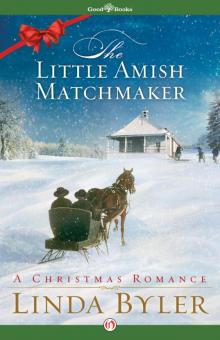 Little Amish Matchmaker
Little Amish Matchmaker The Witnesses
The Witnesses The Healing
The Healing Home Is Where the Heart Is
Home Is Where the Heart Is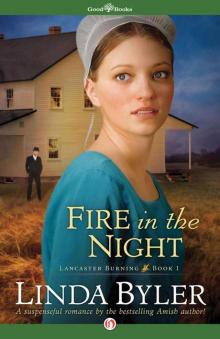 Fire in the Night
Fire in the Night When Strawberries Bloom
When Strawberries Bloom Little Amish Lizzie
Little Amish Lizzie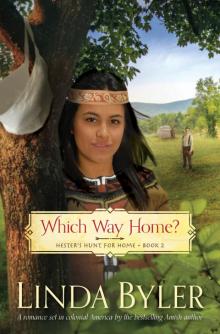 Which Way Home?
Which Way Home? The Homestead
The Homestead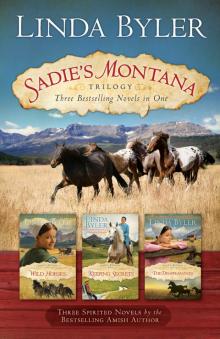 Sadie’s Montana Trilogy
Sadie’s Montana Trilogy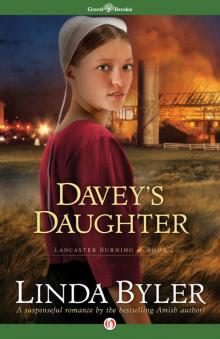 Davey's Daughter
Davey's Daughter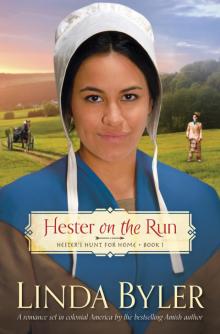 Hester on the Run
Hester on the Run Disappearances
Disappearances Big Decisions
Big Decisions Becky Meets Her Match
Becky Meets Her Match Hope on the Plains
Hope on the Plains Christmas Visitor
Christmas Visitor